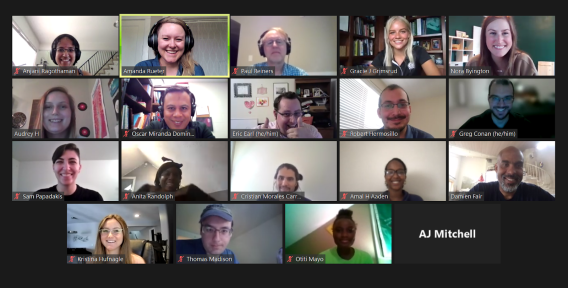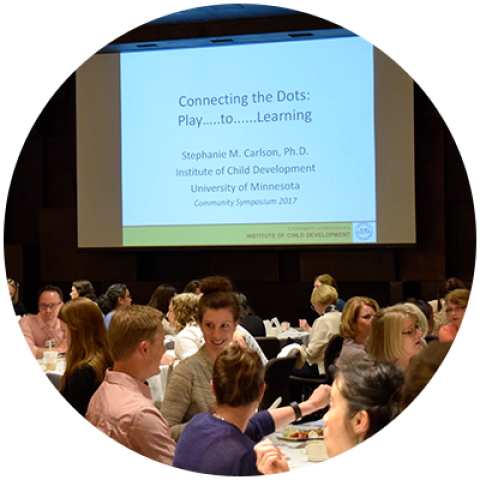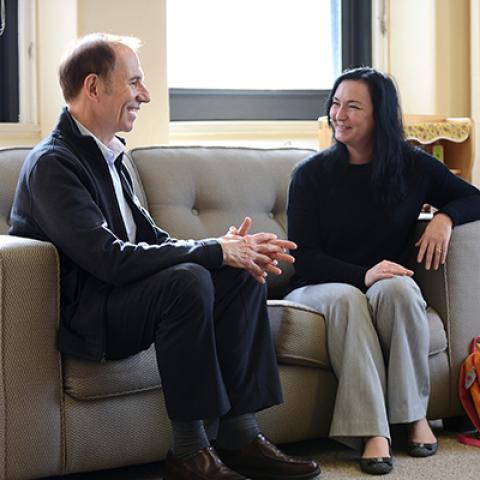Outreach
When we work together, we can make change happen. That’s why one of our priorities is building partnerships with individuals, communities, and organizations around us. We’re committed to finding new ways to translate and share our scientific discoveries. We aim to bring the science of development to as many children, youth, and families as possible.
We strive to be a catalyst for improving lives beginning in childhood and for closing the opportunity gap. Our outreach efforts have included:
- Partnering with community organizations and schools to introduce children and youth to developmental science.
- Starting an internship program to allow our graduate students to gain experience in community settings.
- Developing interventions to promote executive function as a strategy for boosting school readiness in homeless and highly mobile children.
- Serving on advisory councils for museums and nonprofit organizations to support development of science-based early childhood programming.
- Hosting educational events for early childhood educators.
- Giving testimony to the legislature on issues related to our research.
- Exploring partnerships with community colleges to increase access to our early childhood programs.
- Developing measurement tools to evaluate early childhood program effectiveness.
Our partners
We collaborate with organizations throughout Minnesota, including:
Outreach spotlight

Image shows DCAN Lab picture which consists of a Zoom screen with smiling faces in boxes with their names written below their faces. Missing from photo: Eric Feczko, Luci Moore, Anders Perrone, Kathy Snider, Alice Graham, and Samuel Carpenter.

Developmental Cognition and Neuroimaging Lab
The Developmental Cognition and Neuroimaging Lab, led by ICD Professor Damien Fair, PA-C, PhD, shares how it has engaged underrepresented communities in brain education and academic research.
Bringing the science of development to Minnesota communities
Many of our outreach projects aim to disseminate information about child and youth development. One way we do this is through educational programs for our local community. Through our programming—which targets both adults and children—ICD faculty and students share science that can be put into practice by early childhood professionals, teachers, and children themselves.
Growing Brains Outreach
Through Growing Brains Outreach, volunteer ICD graduate students educate young people in the community about brain development and cognition. Funded in part by the College of Education and Human Development, the program serves schools, summer camps, after-school programs, and community groups. Lessons typically target students in fourth to eighth grade, but can be adjusted for other age ranges and abilities. Learn more and schedule a lesson.
Quote from Shreya Lakhan-Pal & Keira Leneman
We hope to help children foster a sense of agency in their own development and inspire a passion for science.
Community symposiums
Our community symposiums bring together policymakers, leaders from schools and nonprofit organizations, and others, to discuss child development research and how it can be applied in community settings. During the symposiums, ICD staff and faculty present on a selected topic and facilitate small group activities and discussions.
Previous symposiums have covered topics, including:
- Strategies for success: Early learning practices that support achievement for all students (2019)
- The importance of play for learning (2017)
- The achievement gap: Why executive function matters (2015)
- Early development and the achievement gap: New findings on why early brain development matters (2013)

Resources
Project for Babies: Child Development Core Story Videos
This project aimed to improve health and developmental outcomes for very young children with special attention to the impact of early experience on the life course. The project produced a five-part series on the Importance of the Early Years that features ICD Director Megan Gunnar, PhD.
Practicing mindfulness with preschoolers
Through a grant from Character Lab, ICD professors Stephanie Carlson, PhD, and Philip Zelazo, PhD, produced a video that highlights how mindfulness and reflection training may improve children's executive function and prosocial skills.
How Children Gauge Trustworthiness: Key Findings
In a video produced by the The Trust Project at Northwestern University, ICD Professor Melissa Koenig, PhD, highlights research showing that children can gather evidence quickly, lose trust rapidly when they witness inconsistency, and make intuitive judgments of trustworthiness.
Ordinary Magic: Resilience in Students Experiencing Homelessness
ICD Professor Ann Masten, PhD, joined AchieveMpls for an EdTalk to discuss risk and resilience in human development with the goal of informing and fostering practices and policies that support success for young people who have experienced trauma.
Minnesota Early Childhood Risk, Reach, and Resilience Report
The Minnesota Early Childhood Risk, Reach, and Resilience Report describes indicators of early childhood development county by county. Authors include Elizabeth Carlson, PhD, ICD affiliate graduate faculty and director of ICD's infant and early childhood mental health training program. The project is sponsored by a partnership of the University of Minnesota, Wilder Research, and Minnesota Departments of Health, Education, and Human Services, with funding from the Irving Harris Foundation. View a report summary, the full report, and an interactive map that highlights indicators by county in Minnesota.
The Shift: The Development and Learning of Kindergarten Age Children
In this video produced by the Minnesota Department of Education, ICD Director Megan Gunnar, PhD, joins Nikole Logan, Childcare Partnership Coordinator in the Office of Early Learning at St. Paul Public Schools, and Carol Schjei, Kindergarten Teacher at Hamline Elementary School, to discuss the important role kindergarten plays in the life and development of a young child.

Center for Early Education and Development
Our Center for Early Education and Development provides professional development and training to early education professionals, so they can achieve the best outcomes for the children they serve in their own communities.